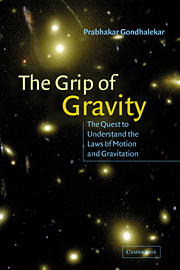
-
Select format
-
- Publisher:
- Cambridge University Press
- Publication date:
- 24 October 2009
- 23 August 2001
- ISBN:
- 9780511525285
- 9780521803168
- 9780521018678
- Dimensions:
- (228 x 152 mm)
- Weight & Pages:
- 0.759kg, 370 Pages
- Dimensions:
- (228 x 152 mm)
- Weight & Pages:
- 0.56kg, 372 Pages
You may already have access via personal or institutional login
Book description
Gravity is the most enigmatic of all known forces of nature. It controls everything, from ocean tides to the expansion of the Universe. The search for the laws of motion and gravitation started over two thousand years ago. The reader is taken on an exciting journey through the subsequent centuries, identifying the blind alleys, the profound insights and flashes of inspiration that have punctuated this search. Despite the fantastic progress that has been made, the true nature of gravity is still a mystery and this book attempts to show how the current developments in string theory(s) (perhaps the 'Theory of Everything') may lead to a new and radical interpretation of gravity. This book describes the fundamental concepts, developments and experiments, both performed and planned, to increase our understanding of gravity and the natural phenomena in which gravity is the principal player.
Reviews
‘Astrophysicist Prabhakar Gondhalekar guides us through gravity’s maze. He begins with Aristotle, dwells on the insights of Galileo, Newton and Einstein, and finishes with 10-dimensional ‘superstring’ theory, the great hope for a theory that unifies gravity with quantum theory. The Grip of Gravity is replete with entertaining digressions and biographical sketches.’
Marcus Chown Source: New Scientist
‘The Grip of Gravity by physicist Prabhakar Gondhalekar traces mankind’s search for the laws of motion and gravitation throughout history, with each chapter devoted to a different scientist from history … Gondhalekar’s historical account of the path of scientific discovery which dominates the first half of the book is highly entertaining … As the book progresses, Gondhalekar continues to describe the history of the field, but places more and more emphasis on explaining the science to non-physicists. His explanations are patient, practical and clear, with the race between theory and experimental verification presented as thrilling scientific adventure … With many subplots skillfully woven into the main account, Gondhalekar has come up with a coherent, comprehensive and up-to-date story of our long quest to understand gravity.’
Jens Gundlach Source: Physics World
‘I recommend it without reservation.’
Auke Slotegraaf Source: MNASSA
‘it is accessible to a (highly) educated general public, at the same time providing a wealth of information on the newest research results on gravitation in space sciences to the scientist working in neighboring fields like astronomy or geodesy … I strongly recommend this extraordinary book (at least) to every space geodesist.’
Helmut Moritz Source: Journal of Geodesy
‘This is a lively and entertaining history that follows the evolution of our scientific understanding against the background of the personalities involved and the political climates in which they lived … a book that is, perhaps unusually for a popular science book, both very readable and understandable. It should appeal to students, interested non-specialists, and experts in the field.’
David Robertson Source: The Observatory
Contents
Metrics
Altmetric attention score
Full text views
Full text views help Loading metrics...
Loading metrics...
* Views captured on Cambridge Core between #date#. This data will be updated every 24 hours.
Usage data cannot currently be displayed.
Accessibility standard: Unknown
Why this information is here
This section outlines the accessibility features of this content - including support for screen readers, full keyboard navigation and high-contrast display options. This may not be relevant for you.
Accessibility Information
Accessibility compliance for the PDF of this book is currently unknown and may be updated in the future.


